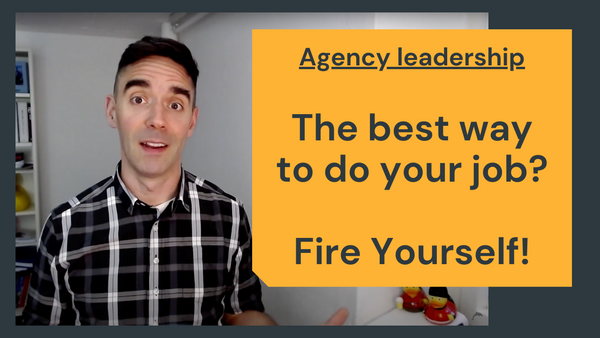Our lead developer just resigned in the middle of this critical project.
"Don’t worry. It’s fiiiiine. Everything happens for a reason". Those are my 3 most used sentences, both at home and at work.
I am this guy, who always sees the positive side of any situation, and has a laid-back attitude to most things in life.
Sometimes, this is misunderstood or over-analysed by the people around me. I have experienced this over the years, through several instances: when my colleagues asked me “Are you a robot?”, when a leadership coach said “I cannot really pinpoint where you fit in my models” or when my wife wondered “do you have any emotions?”
This personality trait was also confirmed 6 years ago when doing the Myers-Briggs test with our leadership team at work. The Myers–Briggs Type Indicator is a mini-questionnaire indicating psychological preferences in how people perceive the world and make decisions. I belong to the ISTJ category: Introvert, Sensing, Thinking and Judging.
Here is what they all mean:
Based on this result and looking at the definitions of each trait, it makes it clear that I am more on the “thinking” than the “feeling” side. It also shows that I can come up with practical solutions, sometimes neglecting the emotional impact of things.
A few years later, we also went through the DISC behaviour assessment tool, and again, I was singled out from the rest of our team. From DISC, I was the only “Contemplator”. The main traits from that report include:
- Contemplators are analytical and logical people. They think through alternatives and choices carefully.
- They are very centred on the task at hand, are steady and dependable
- They are driven to do the best and think there is always room for improvement
But also:
- Contemplators are sensitive to people, but the logical, task-oriented side can take over quite easily
- Contemplators are centred on "the facts" and while they have good intentions, they may lose sight of what is best for people while focusing on protocol, facts and details”
This opened my eyes on some new elements and brought some balance in my decision-making process, and highlighted some areas for improvements.
My DISC results:
“public self / the mask” “private self / core” “perceived self / mirror”
The 3 patterns are very similar. It shows that I have a good sense of self-awareness, but also that at work, I am comfortable and “in control” – so I don’t feel the need to be someone that I am not.
I never really believed in those tests but I was amazed at how accurate they were for me. And if those characteristics have a name, there must be plenty of others like me!
But does this mean I have no emotions? Of course not.
For me, once something happens, there is no point in wasting time or energy about the negative consequences. This will only cloud your mind and stop you from moving forward, putting you further at risk of making things worse. I’d rather focus my mind on the next steps and how I can bounce back, make the most of the situation. Seeing the positive side of it brings some positive motivation. It does require some strong control of the mind, so it raises more questions:
Where does this come from? How do I manage to control my emotions in that way?
Personality is something that evolves over time, even if the main traits are continuous. I have been thinking about what made me that way and I continue to explore several areas in chronological order of my life to try and understand what had an impact:
- Genetics: is it because I am left-handed and my left brain is wired to be more methodological and analytical?
- Hereditary: how big of an impact is how my family raised me, how I modelled a mix of my mum and dad, taking the best bits of each one?
- Education and youth: why was I more attracted to science? How I started with judo at 6 and taught me discipline, respect and confidence? How I moved to team sports in my early teens but went back to cycling, badminton and tennis (more individualistic sports) in my late teens?
- Role models: by reading biographies of Michael Jordan & Yannick Noah, how I took some of those models as a way of being successful?
- An early passion for programming: how my studies and internship made me enjoy the rigour of algorithms, driven by facts and common sense?
- Some of my life decisions in my early twenties: when I decided to leave France to go work in the US. This is where I met my wife and decided to marry into a mixed culture. Travelling to Asia to experience “culture shock” and settling back in the UK for 14 years, before starting a new chapter of our family life in Berlin for the last 5 months...
I do believe that the personality we develop is made up of all these experiences. There must have been a dozen of these moments that had the biggest impact on how I am today, but I am convinced I will continue to evolve and gain new perspectives… starting with this Write of Passage class, this summer of 2020!
I remember doing some personality tests back in high school, during a class on interpersonal communication. That day, the teacher put us in a situation where we had to imagine leaving home and driving to an important job interview. But on the way, our car broke down and we had to analyse how we’d react. The default reaction would be to start panicking about how we’ be late to the interview, stress about the costs of recovery, or worry about how this would impact our upcoming holidays. But I was drawn to the opposite scale and would immediately try to find solutions: get alternative transport, organise recovery… and I continue to use that mindset every day in my life.
How does it make me a better dad / husband / leader?
As a dad of 2 kids and a “chief” in our agency of 55 staff, I believe my calmness has an overall positive impact on the people around me.
At home, it helps reassure my kids when things don’t go their way. I try to be the voice of reason so they understand their emotions.
At work, it gives me focus and the ability to analyse several possible outcomes before making decisions. I usually start with “what is the worst thing that could happen” but often analyse that even if the worst was to happen, we could still spin many positives out of it.
- We lost a pitch to a new client? Let’s get feedback to do better next time. They probably would have been a difficult client anyway!
- A colleague decides to resign? Let’s learn the reasons behind it and how we can improve. We’ll find a replacement who will be even more motivated.
- A client delays or cancels a project? Let’s quickly re-allocate our team on another value-add project that will help us grow and get our next client.
- We need to change the delivery plan? Let’s find a way to spin something positive from it, giving the client more time to populate the content or train their team on the new system.
There are obviously red-lines to this laid-back attitude. If there is an upcoming deadline to deliver a specific project, missing it won’t be “fiiiiine”! In those situations where the pressure is ramping up, I have to remain calm not to be distracted. I need a clear mind to think about a plan, explore all options and focus all our efforts on resolving the challenges ahead of us. I have realised that I am longing these new and unknown situations, where I get to feel stress or fear of the unknown. I always volunteer to do something new like public speaking, sitting on a panel or launching a blog and write about myself.
Another trait that helps in leadership positions is that I tend to go for compromise over conflict. So as the pressure builds, I can retain my introverted nature, and move to a more people centred approach over the logical/reasoning characteristics.
A leader needs to be that role-model, demonstrating positive behaviours whilst being understanding of the challenges the project team faces. At the end of the day, “you reap what you sow” so this is my way of building a self-sufficient team that can make good decisions. Working in a multicultural team forces me to be even more empathetic, as we all have different backgrounds, values and personal issues affecting our day to day mood or how we respond to stress.
Even before being aware of the Myers-Briggs or DISC traits, I have always felt that my role was to help others. I recently heard Scott Galloway claim that “greatness is in the agency of others” and it immediately connected with me. More than leaving a legacy in business, I want to have a positive impact on others, and this is what brings more fulfilment to my life.
Another point this highlighted is the need to have a diverse team. I am at the opposite scale of my business partners on those personality quadrants! But this is also probably one of the reasons we continue to grow and succeed as a team: we balance and complement each other.
To conclude, I strongly believe that fewer worries and stress over the things one cannot control brings a higher level of happiness and success. I am always grateful for the present moment and see any new situation as something exciting to discover. I am just satisfied with being healthy, surrounded by a loving family and doing a job I enjoy very much at the service of an amazing team I can continue to support.
So next time something unexpected happens, think about the following points:
- What can I do right now to minimise the impact of this challenge?
- How can I help others around me make sure they are not too affected by this?
- Apart from reverting to the way it was, what is the next best thing that could happen now?
and remember: there is always a positive spin to any event, always a way through... things will work out: it will be “fiiiiine”!



